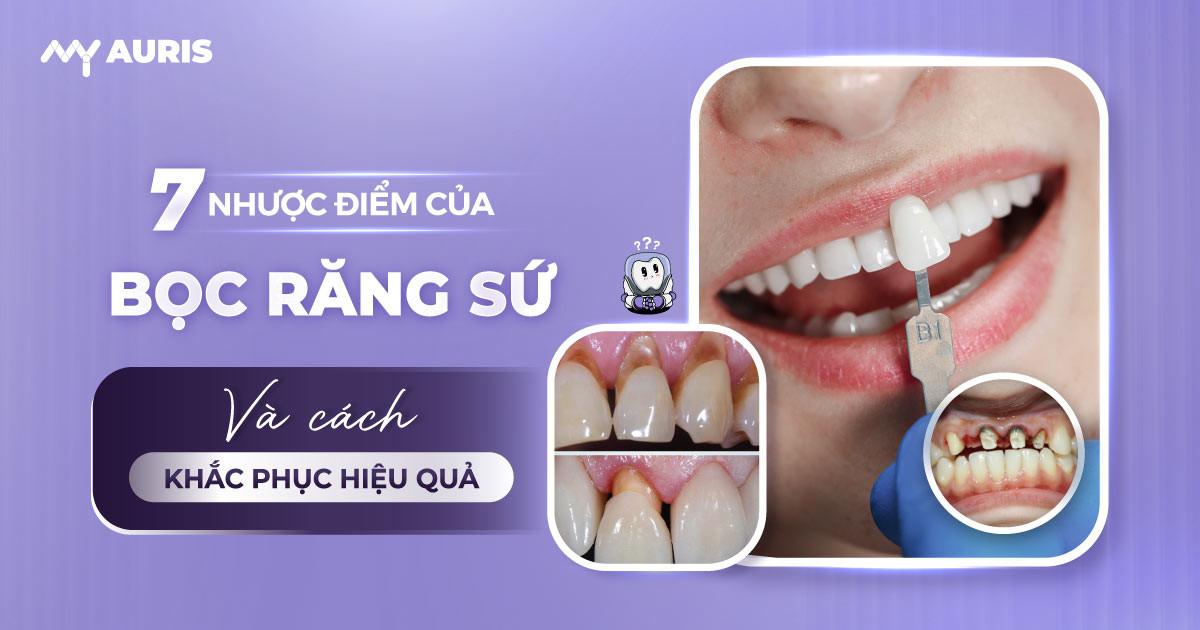What Are Porcelain Crowns? Who Should Get Porcelain Crowns?
Porcelain crowns are a method of tooth restoration that uses porcelain crowns to cover real teeth that have been ground down. Porcelain crowns have the same color, shape, and size as real teeth, bringing natural beauty and restoring chewing function. There are many types of ceramic materials, from metal to all-ceramic, meeting different aesthetic and economic needs. Porcelain crown technique requires a dentist with expertise and experience, ensuring the perfection of porcelain teeth. The porcelain crown process includes examination, consultation, grinding teeth, taking impressions, making porcelain crowns and permanently attaching them to teeth.
Benefits of porcelain crowns:
Ceramic crowns bring many benefits to oral health and confidence:
- Aesthetics: Improve color, shape, size of teeth, conceal chipped, misaligned, stained teeth.
- Function: Restores the ability to chew and pronounce.
- Protection: Protects real teeth from the effects of bacteria, limiting tooth decay.
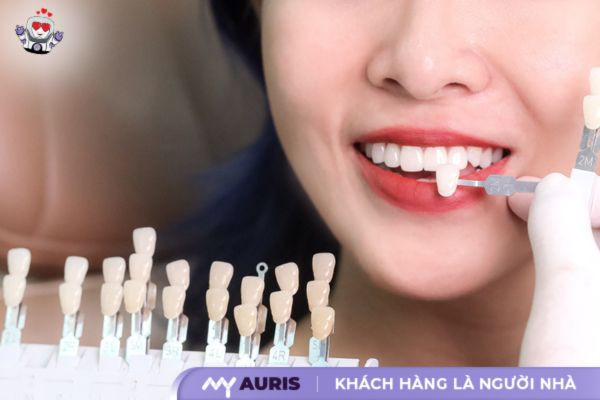
Who should have porcelain crowns?
Ceramic crowns are a suitable dental treatment solution for the following cases:
- Teeth are severely stained and cannot be whitened.
- Chiped, broken teeth.
- Slightly misaligned teeth, don’t want braces.
- Teeth with worn enamel and dentin.
- Teeth that have undergone root canal treatment need protection.
Ceramic crowns bring many benefits to oral health and confidence. However, you need to consider carefully, research information and choose a reputable doctor or dental clinic to achieve the best results. Don’t forget to take proper care of your teeth to maintain good oral health and a beautiful smile.
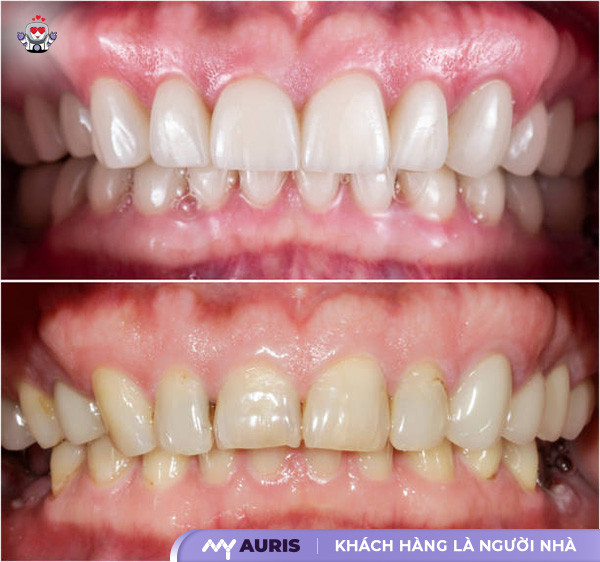
7 Disadvantages of Porcelain Crowns
Real Teeth Are Invaded, Cannot Be Restored
Porcelain crowns require grinding down real teeth to create space for the porcelain crown. Tooth grinding is an invasive process that cannot restore tooth enamel and dentin. This means that real teeth are permanently damaged. Porcelain materials, no matter how good, cannot replace the perfection of natural teeth. The Dental Association recommends minimizing tooth grinding and only doing it when absolutely necessary for dental treatment. Deciding to get porcelain crowns means accepting the harmful effects of porcelain crowns on the real tooth structure, with potential risks in the future.
Porcelain Crowns Are Less Sensitive, Affecting Functions Chewing
Ceramic teeth, even though they are highly durable, cannot feel like real teeth. The ability to sense food and temperature will decrease, affecting chewing activities. You may have difficulty distinguishing between hard, soft, hot, and cold foods, leading to the risk of porcelain teeth breaking, or causing damage to the gums and jawbone. Choosing the right type of porcelain teeth and the correct porcelain crown technique from a dentist will help minimize this disadvantage.
Shorter Lifespan Than Real Teeth
The lifespan of porcelain teeth depends on many factors: porcelain material, porcelain crown technique, oral care, eating habits… On average, porcelain teeth have a lifespan of 10-15 years, much shorter than real teeth. After this time, you may need to replace the crown with a new one, incurring additional costs and time. Compare other dental restoration methods such as dental implants, porcelain veneers… to have a choice that suits your needs and economy.
High Cost of Porcelain Dental Crowns
Cost of dental crowns Porcelain is relatively high compared to other dental services. The price of porcelain crowns depends on the type of porcelain material, number of teeth, dental clinic… Economic factors should be carefully considered before deciding. Learn carefully about the process of porcelain crowns and the price of porcelain crowns at reputable clinics to avoid risks in cost and quality.
Complications When Covering With Wrong Technique
Porcelain dental crown technique has a great impact on kAesthetic and functional results of teeth. Improper technique of porcelain crowns can cause many complications of porcelain crowns such as: exposed roots, gingivitis, bad breath, tooth decay… Choosing a good, experienced dentist and a reputable dental clinic is an important factor to ensure safety and treatment effectiveness.
Limit Eating Hard or Too Hot/Cold Foods
Ceramic teeth, despite their high durability and abrasion resistance, can still break, crack, or break if subjected to too much force. or sudden temperature changes. You need to limit eating hard, too hot or too cold foods to protect your porcelain teeth and prolong their life. Proper care of porcelain teeth also helps minimize this risk.
Prone to Oral Diseases After Time of Use
After a period of use, bacteria can accumulate at the gum line, causing gingivitis, bad breath, tooth decay… Thorough and proper oral hygiene, combined with regular dental examinations, is essential to maintain good oral health and prevent oral diseases. Dental restoration is just one part of general dental care.
6 Potential Risks After Porcelain Crowns
Porcelain Teeth Are Rough and Difficult to Eat and Chew
After porcelain crowns, feeling rough and stuck in the mouth are common complications. Improper porcelain crown technique, incompatible ceramic material or inappropriate porcelain tooth size can cause difficulty in chewing. This affects daily eating functions, causing discomfort and fatigue. Choosing a reputable dental clinic and experienced dentist is an important factor in minimizing this risk.
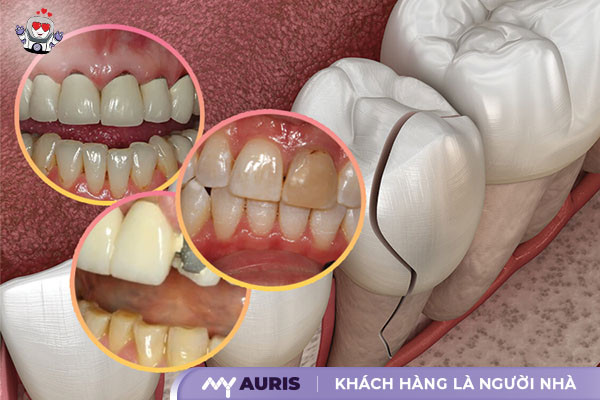
Ceramic Teeth Are Easily Broken, Cracking, Fracture
Even though porcelain material has a certain durability, porcelain teeth are still susceptible to breaking, cracking, and breaking due to the harmful effects of strong chewing force or impact. The habit of grinding teeth and eating hard foods also increases the risk. Choosing the right type of porcelain teeth, proper care of porcelain teeth and regular dental check-ups helps prolong the life of porcelain teeth.
Reduce Tooth Sensitivity
Cover Porcelain teeth require tooth grinding, which reduces tooth sensitivity. This affects the ability to sense temperature and pressureforce when eating and chewing. However, this feeling usually subsides over time. The dentist will advise on minimal tooth grinding techniques to maximize tooth enamel and dentin.
Real Teeth Are Painful and Sensitive After Covering
Pain and sensitivity after porcelain crowns are complications that can occur due to incorrect porcelain crown technique, gingivitis or tooth decay. Timely dental treatment helps relieve pain and prevent further complications. Proper oral care, using dental floss and mouthwash helps prevent infection.
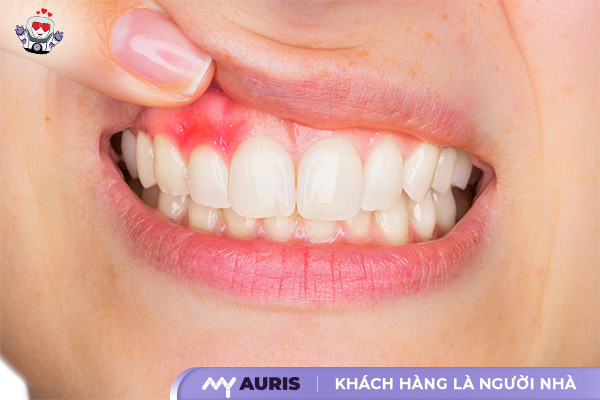
Porcelain-covered teeth are prone to blackened gum edges, losing aesthetics
Black gum lines after porcelain crowns are a common harmful effect, causing loss of aesthetics. The cause may be due to poor quality ceramic material, non-standard porcelain crown technique or the body’s reaction to the metal in the porcelain crown. Choosing high quality, biocompatible ceramic materials helps limit this complication.
Teeth Roots Are Exposed After a Period of Use and Food Retention
After a period of use, the tooth roots may be exposed, allowing food to get stuck in, causing bad breath and tooth decay. Thorough oral hygiene, using dental floss and mouthwash helps remove food scraps and prevents bacteria from growing. Visit the dentist periodically to check and promptly handle problems that arise.

Important Notes Before Dental Crowns Porcelain
Learn Carefully About Porcelain Crowns and Choose the Suitable Type of Porcelain Teeth
Before undergoing dental treatment, it is extremely important to learn thoroughly about the porcelain crown process, the advantages of porcelain crowns, the benefits of porcelain crowns, as well as the harms of porcelain crowns. important. You need to understand clearly the types of ceramic materials (such as porcelain crowns), porcelain crown techniques, the lifespan of porcelain teeth, andCost of porcelain crowns to make a decision appropriate to your dental condition and financial ability. Compare tooth restoration methods such as porcelain crowns and dental implants to choose the most optimal method.
| Criteria | Ceramic Cover | Dental Implant |
| Purpose | Improve aesthetics, conceal score | Replace lost teeth, restore function |
| Durability | Inferior | High more |
| Longevity | Limitations | Long-term, possibly permanent |
| Cost | Lower | Higher |
| Tooth grinding | Few | Many (in some cases) |
| Treatment duration | Short | Long |
| Ability to restore chewing function | Poor | Good, equivalent to teeth real |
| Aesthetics | High | High |
Carefully consider the color, shape, size, material, biocompatibility, translucency, abrasion resistance and adhesion of each type of porcelain tooth.
Choose a Reputable Dentist and Dental Clinic
Dental doctor Skill and experience are factors that determine the success of porcelain crowns. Find out carefully about reputable doctors and dental clinics, recognized by the Dental Association. Ensure the clinic is fully equipped with modern, sterile equipment, ensuring medical safety. Consult friends, relatives, read online reviews to choose a reliable dental address. The doctor’s porcelain crown technique directly affects the aesthetics, function, and longevity of porcelain teeth.

Assess your Oral Health Status and Consult Carefully with your Doctor Si
A general examination of oral health is an indispensable step before getting porcelain crowns. The doctor will examine teeth, gums, mouth, jawbone, enamel, and dentin to evaluate the current condition, detect diseases such as gingivitis, bad breath, and tooth decay. Based on the examination results, the doctor will advise on appropriate dental treatment methods, choose the type of porcelain teeth, and answer all questions. about disadvantages, porcelain crowns, harms, complications, risks, tooth grinding, broken porcelain teeth, porcelain crown care. This is an important step to ensure oral health and achieve high aesthetic results.
Be Psychologically Prepared and Follow Oral Care Instructions After Porcelain Crowns
Porcelain crowns are a dental treatment process that requires tooth grinding. You need to prepare a comfortable mind and cooperate with the doctor throughout the process. After porcelain crowns, strictly following the doctor’s oral care instructions is a prerequisite to maintain the longevity of porcelain teeth, prevent complications, and ensure good oral health. Proper oral care helps prevent gingivitis, bad breath, tooth decay, broken porcelain teeth, and maintain aesthetics. high ability to restore chewing function and permanent properties of porcelain teeth. Porcelain crowns not only bring aesthetics and function but also affect psychology and confidence.


